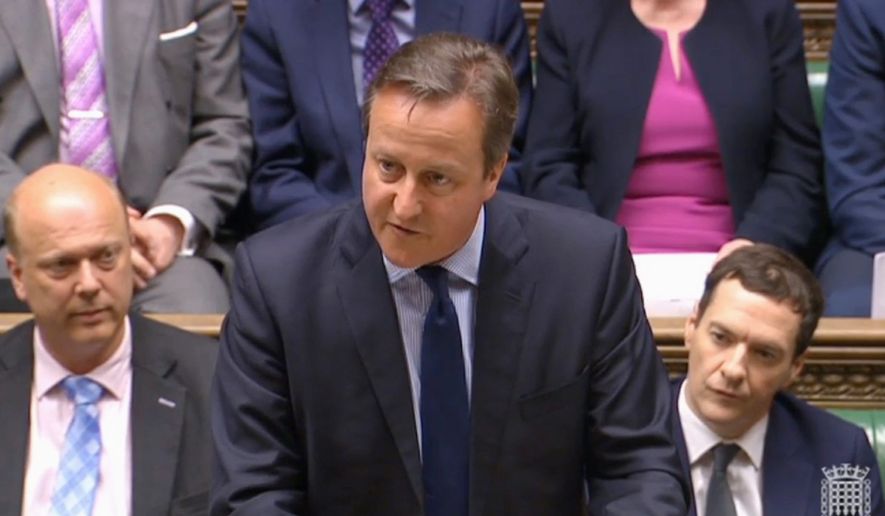British Prime Minister David Cameron on Monday became the latest world leader struggling to put his links to the Panama Papers scandal behind him, but not before a member of the opposition Labor Party earned a one-day timeout from parliament by memorably labeling the prime minister as “Dodgy Dave.”
Parliament member Dennis Skinner, who has a history of impolitic remarks, sparked an uproar during the prime minister’s weekly “Question Time.” He was ordered to leave the House of Commons for the day after he laced into the Conservative prime minister in the wake of revelations Mr. Cameron’s late father Ian Cameron had set up an offshore investment fund and that Mr. Cameron himself had made a significant profit when he sold his interest in 2010.
Noting that he had previously questioned the prime minister’s finances and not gotten a reply, Mr. Skinner said Monday that “maybe Dodgy Dave will answer it now.”
Mr. Cameron kept his cool, but Commons Speaker John Bercow repeatedly asked Mr. Skinner to withdraw the offending word, saying it violated debate rules accusing another member of acting dishonorably.
When the 84-year-old Mr. Skinner refused to withdraw the offending adjective, Mr. Bercow ordered him to withdraw from the chamber for the day, with some MPs calling out “bye-bye” as the MP left.
The extraordinary scene demonstrated the political peril Mr. Cameron faces and the continuing global fallout from the Panama Papers leaks, which have fingered top officials, their aides and family members for setting up thousands of secret offshore accounts and investments through a Panama-based law firm. Already the revelations have forced the prime minister of Iceland to resign, sparked official probes in at least 20 countries and implicated figures close to Russian President Vladimir Putin and Chinese President Xi Jinping.
In Britain the scandal has given new momentum to the opposition Labor Party, which was badly defeated in last year’s general election. Labor Party leader Jeremy Corbyn was on the offensive Monday, saying the Conservative majority was “incapable of taking global action against tax dodging” because Mr. Cameron did not “fully appreciate the anger that is out there” about the secret ways the wealthy have to avoid taxes.
The furor was especially ill-timed for Mr. Cameron as he is due to host a major international anti-corruption summit next month in London.
The Panama Papers revelations sparked a furious round of tax record disclosures from top government officials, with Mr. Cameron, Mr. Corbyn, Chancellor of the Exchequer George Osborne and London Mayor Boris Johnson among those hastily making public details of their tax returns in recent days.
Fine line
Mr. Cameron has walked a fine line, trying to get ahead of the political scandal while defending the memory of his father and denying there was any attempt to conceal income in his father’s investment portfolio. The prime minister compounded his PR problem by initially balking at requests to detail his personal interest in Blairmore Holdings, the offshore firm set up by his father, before admitting he owned shares that he sold for a profit in 2010, just before he first took office as prime minister.
“I accept all of the criticisms for not responding more quickly to these issues last week,” Mr. Cameron told a packed and occasionally raucous session of Parliament Monday. But “I was angry about the way my father’s memory was being traduced.”
He said his father established the fund through the Panamanian law firm to be able to trade in dollar-denominated securities, which he called a legitimate use for such a fund. Financial experts say the fund could also be used to space out estate payments to Mr. Cameron and other heirs after the senior Mr. Cameron died in order to minimize the tax bite.
The prime minister also warned against an overreaction to the Panama Papers leaks. “We should differentiate between schemes designed to artificially reduce tax and those that are encouraging investment,” he said Monday. “This is a government — and this should be a country — that believes in aspiration and wealth creation.”
The government has also resorted to the classic short-term political fix: establishing a new task force to look into charges of tax evasion and money laundering in the light of the Panama scandal. The task force is supposed to report its findings to Mr. Osborne and Home Secretary Theresa May before the end of the year.
Mr. Cameron, composed and occasionally smiling at Monday’s pointed attacks from the opposition, appeared to emerge from the session largely unscathed, with members of his Conservative party majority firmly defending him. But some say the longer-term damage may be more substantial.
The embattled prime minister “carried the day among MPs,” the left-wing Guardian newspaper wrote, but “this was a pyrrhic victory.”
“The long-term residue of these events will be both toxic and defining for the prime minister, his party and his government.”
The lasting memory from Monday’s sparring may be the extraordinary exchange over the word “dodgy” between Mr. Skinner and Mr. Bercow, the speaker. The speaker at one point said Mr. Cameron did not have to answer the question until Mr. Skinner “withdraws that word and thinks of another.”
“Which word?” Mr. Skinner then asked.
The speaker replied, “I think he knows the word beginning with ’D’ and ending in ’Y’ that he inappropriately used.”
The prime minister, Mr. Skinner replied, “has done more to divide this nation than anybody else. He’s looked after his own pocket.”
“I still refer to him as ’Dodgy Dave.’ Do what you like.”
• This article was based in part on wire service reports.
• David R. Sands can be reached at dsands@washingtontimes.com.




Please read our comment policy before commenting.